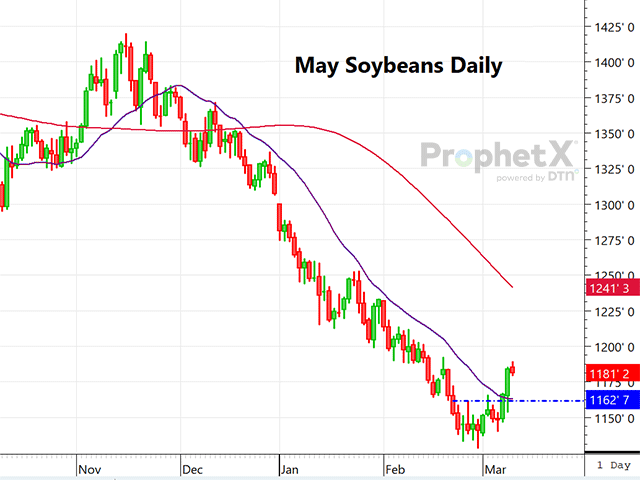Technically Speaking
Soybeans Rise on Higher China Demand, But Can The Strength Continue?
Following no change in the U.S. soybean balance sheet on the latest WASDE report, beans were still able to rally sharply Friday, eclipsing the 20-day moving average, rising above and closing above that benchmark to end the week. May is starting the new week a bit lower but is still more than 16 cents higher than the average. May will have to hold support at $11.66 to $11.67 and stay above the 20-day at $11.62 1/2 to keep the rally going.
Although the U.S. balance sheet was left untouched, despite U.S. soy exports being 19% lower than a year ago, the USDA made some significant changes to both past and present China soybean imports. The years from 2020-21 to 2022-23 featured a rise of 3.65 million metric tons (mmt) on China imports, while they revised the 2023-24 crop year China imports by 3 mmt to a new record-large 105 mmt (3.86 bb). While the jury is still out on Brazil soy production with the harvest now 53% complete, should production be more in line with CONAB's estimate of 149.4 mmt, the U.S. could pick up some additional soy export business. Some private analysts see the Brazilian crop being more than 10 mmt lower than the USDA estimate at 145 mmt (5.32 bb).
The rally above the 20-day average was certainly a bullish development, but any continuation of the strength will be determined by the size of Brazil's crop and the ability to stay above the support mentioned. Working in favor of continued strength is the fact that noncommercial traders are holding a record net-short position of 197,000 contracts as of last Tuesday. On the other side of the coin, the doubling of Argentine production from a year ago, and should the USDA's lofty estimate turn out to be correct, South America will again have the upper hand in satisfying China demand.
P[L1] D[0x0] M[300x250] OOP[F] ADUNIT[] T[]
May corn futures were also able to rise above the 20-day average last week for the first time in months. Corn exports and ethanol usage are currently trending above the weekly pace USDA's yearly estimate would imply. Friday's March WASDE and USDA's decision to leave corn demand alone was a bit of a surprise to the trade, as was the decision to leave Brazil's corn production estimate unchanged. The 124-mmt (4.88 bb) estimate for Brazil's corn crop exceeds CONAB's estimate by a huge 10 mmt (394 mb). We will get a better idea when CONAB prints a revised estimate Tuesday.
While corn's action late week was promising for the continuation of the rally, there are a few roadblocks in the way. The U.S. carryout is a still comfortable 2.172 billion bushels (bb), and Argentina's production is expected to be sharply higher than a year ago. Ukraine has continued aggressively sell corn, with Black Sea port shipping reported to have reached pre-invasion levels, according to Ukraine's Zelensky. However, with much growing weather to endure for Brazil's safrinha corn crop, and with the prospect for domestic corn acres to be sharply lower in the coming year, there are reasons to be optimistic for corn prices headed into planting and a seasonal period of strength. Another thing in favor of strength is the fact that managed money funds as of last week were net short close to 300,000 contracts of corn. However, a bullish weather spark will likely be needed to carry any rally very far.
**
Comments above are for educational purposes only and are not meant as specific trade recommendations. The buying and selling of commodities, futures or options involve substantial risk and are not suitable for everyone.
Dana Mantini can be reached at Dana.Mantini@DTN.com
Follow him on X, formerly Twitter, @mantini_r
(c) Copyright 2024 DTN, LLC. All rights reserved.






Comments
To comment, please Log In or Join our Community .